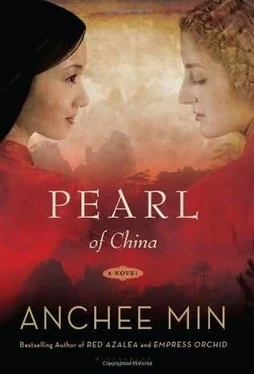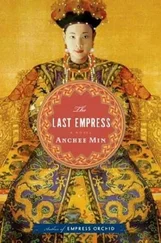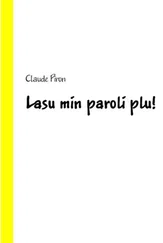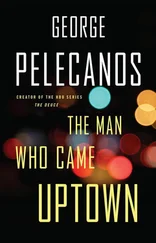“I heard the sound of a radio. What’s going on?”
“Nothing.”
“Can I come in?”
“No, you can’t.”
“Don’t make me wake up everyone,” I threatened.
“I said no.”
“Let me in, please.”
“No.”
“You are hiding something, aren’t you?”
“It’s none of your business…”
“Let me in!”
“Don’t make me push you…”
“Willow!” Papa’s voice came from inside.
Bumpkin Emperor pivoted his body, and I entered.
Papa’s face was lit by candlelight. He was holding a brick-sized box. It was a radio of a fancy make, better than the one Dick had owned. Papa turned the radio dial. Static filled the shadowy room. The scene reminded me of a propaganda film in which criminals gathered in conspiracy. Papa was in his pajamas. He was calm and focused. I had never seen him concentrating like this. He tilted his head to the side as he searched for a signal and listened. I looked around and saw more faces. Besides Bumpkin Emperor and his sworn brothers, there were Carpenter Chan, his sons, and a few others. They all looked nervous but excited.
“What are you listening to?” I asked.
“Sh-sh!” Bumpkin Emperor pushed my head down.
Papa kept adjusting the dial. Finally there was a human voice. Papa was ecstatic. “I got it, I got it!” The signal didn’t last. It turned to static again. Papa kept trying while the others waited patiently. After a long while the signal returned. A voice speaking foreign-accented Mandarin came on. “This is Voice of America broadcasting from the United States.”
The radio had belonged to Bumpkin Emperor. It had been a gift from Chiang Kai-shek when Bumpkin Emperor was at the peak of his power as a warlord. The two men had joined forces against Mao. What made the radio valuable was that it had been made in America for military use. Bumpkin Emperor had donated the radio to the church after Papa had converted him.
Papa no longer felt isolated since he’d mastered the radio. He was obsessed with it. Papa shared the latest world news with carefully selected church members. Life became more bearable, although not better. The Cultural Revolution continued and Mao worship intensified. Food shortages became the worst they’d been since the Great Leap Forward. Vanguard loosened his grip on me in order to catch people who were selling vegetables they grew in their backyards.
One day, a stranger visited me. His name was Chu. Although I didn’t recognize him, I remembered the name. He was the Beijing general Dick had talked into surrendering in 1949. Dick had been proud when he saved the Imperial city and avoided a bloody battle in the streets of Beijing. Dick had negotiated with General Chu. Mao had promised Chu a high-ranking position in the People’s Liberation Army.
The man who stood in front of me was sick and thin. He had wax-yellow skin and sunken eyes. He spoke in a whisper and his words confused me. He said that he had been Dick’s cellmate in prison. He then explained that he was on a medical release from the national prison. I told him that Dick was working for Mao. He said that it was no longer the case.
“What do you mean by ‘cellmate’?” I asked. I hadn’t talked to Dick for two years. I knew nothing about his life.
General Chu produced a wadded paper on which ink letters the size of ants were written.
Dear Willow,
This letter gives me a chance to explain everything, which I consider a blessing.
I am writing from the Southwest Labor Prison near Tibet. You might wonder what I did to offend Mao. Well, again, the story has to do with Pearl Buck. But truly my own ambition is to blame.
Mao summoned me on the evening of May 30, 1969. Madame Mao was there and unusually friendly toward me. Mao didn’t seem to be aware that it was the middle of the night. He was dressed in a white bathrobe. His hair was wet and he was barefoot.
Once I was seated he simply said, “Pearl Buck wants to come to China. Premier Chou En-lai thinks we should make an exception and open the door for her. What do you think?”
Out of the corner of my eye I was aware of Madame Mao’s wooden expression. A slight smile quivered on her lips.
Given all my personal history with Pearl Buck, I marveled at Mao’s audacity. Had he forgotten that you, my wife, had gone to prison because of your refusal to denounce your friend? But I also knew that Mao’s desire for international recognition had only grown stronger over the years. No matter how strong he was at home, his reputation had not kept up abroad. He would do anything to gain the prestige that had eluded him. I saw at once that he was willing to rewrite history if it would fulfill his ends. I wasn’t so sure about his wife.
I sat there sweating in my chair as Mao went on. He asked me to cultivate Pearl Buck and convince her to change her mind about China. “Tell her we now rule a quarter of the human race on earth,” Mao said.
Mao revealed that his intelligence agency had recently reported that Pearl Buck had been a consultant to President John Kennedy. Mao believed that she had the potential to be his bridge to America.
Looking back, my fate was set. Madame Mao was jealous of any female Mao was interested in. She had made secret arrests, tortured, and murdered in order to gain Mao’s affection back.
Unfortunately, my own ambition made me willfully blind. Connecting Mao and Pearl Buck would be the best thing I could do to advance my career. Going down in history tempted me so much that I played with fire. The wind was in my favor, I thought, and I’d be a fool not to ride it. I planned on making a case to back up Chou En-lai’s position.
I translated Pearl’s recent articles on China and carefully edited out her negative comments. But before I submitted the material to Mao, the wind changed its direction. Madame Mao got ahead of me.
As evidence against Pearl, Madame Mao presented parts of her latest novel, Three Daughters of Madame Liang, in which Pearl depicted senseless murders taking place during the Cultural Revolution as if she had witnessed it. The novel amazingly mirrored the truth.
From that moment on, Mao lost interest in Pearl Buck. But Madame Mao was not finished with me. She saw Pearl Buck as a personal threat and was determined to punish anyone with a connection to her. Accusing me of deceiving Mao, Madame Mao had me arrested.
I expected Mao to offer his protection, but he didn’t.
I met General Chu in prison. What a twist of fate! On one hand, I felt guilty because Mao never honored his promises-the terms I negotiated. Once Chu surrendered, he became useless to Mao and was abandoned. Although Chu was granted the title of commanding general of the People’s Liberation Army, it was a paper title only. Chu ended up without the army or his freedom. I felt that I had let the man down. Ending my life in prison almost makes me feel better, because it separates me from Mao.
The Tibetan weather is harsh and the air is thin. We live like rodents in underground holes, which we dug ourselves-talk about digging one’s own grave. However, the dead do not get buried here. The prison doesn’t have enough prisoners to dig the holes to bury them all. Instead, the dead are dragged away and left in the open about a half mile from where we live. When the wind is strong, we can smell the rotten stench. Eventually, Tibetan wolves and buzzards eat what is left.
I live on leaves, earthworms, and mice. Before summer ends, the leaves and earthworms will be gone. We have stripped the trees of bark and eaten the rough fiber. Now those trees have died. We don’t have enough energy to catch mice. I have begun eating “suicide seeds.” This is a kind of grass seed that one slowly dies from. At least it cures the hunger. I’ve been constipated for weeks. My belly hurts so much that I pass out from time to time. You would never imagine the scene: cellmates helping each other scoop the shit from each other’s rear ends with bare fingers. It is a bloody business.
Читать дальше












